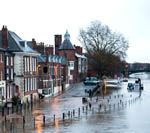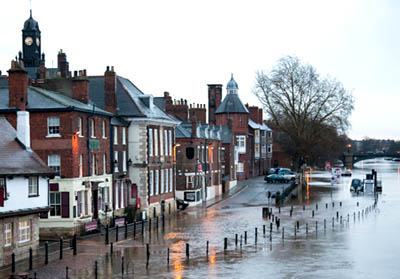Have you seen the forecast?
No wonder we rely on the weather for our conversation: it has been the cause of some of our greatest inventions, and fortunes in war


Who, from the hotly contended field, takes the Golden Barometer as Britain's most possessed weather obsessive? Would it be William Merle, the so-called Father of Meteorology, who had the curious idea of keeping a daily weather journal in 1277, persisting doggedly for the next 67 years? Or William Murphy Esq, MNS (Member of No Society), Cork scientist and author of little repute, whose 1840 Weather Almanac (on scientific principles, showing the state of the weather for every day of the year), despite correctly predicting the weather for only one day, became a bestseller?
How about Thomas Stevenson, one of ‘the Lighthouse Stevensons', who measured the force of an ocean wave with his ‘wave dynamometer' before going on to devise the Stevenson Screen weather station? Admiral Beaufort, perhaps, whose eponymous wind scale sailors still use? Or the artist John Constable, whose ‘sky-ing' cloud paintings ushered in a new, scientific approach to the depiction of the heavens? Dr George Merry-weather, inventor, is surely a contender for his 12-leech ‘tempest prognosticator'.
Then there's poor Group Capt J. M. Stagg, on whose knotted shoulders rested the decision of whether to go, or not to go, on D Day. Or perhaps it's the humble Mr Grisenthwaite, who's assiduously kept a two-decade lawn-mowing diary (and why not?) that was, in 2005, accepted by the Royal Meteorological Society as documentary evidence of climate change?
For the British, our national consciousness, indeed our whole turbulent history, is drenched by weather. The legacies are everywhere, from latch chains on front doors (a consequence of the Ratcliffe Highway Murderer in 1811, which took murder into our homes before disappearing into the East End fog) to the Norman invasion (stormy weather in the Channel allowed William to land unopposed). Storms also gave us the lighthouse, the pencil, the lifeboat, longitude reckoning and the first storm warnings. Wind saved us by blowing the Spanish Armada to destruction. A vicious hailstorm gave rise to Norwich Union Insurance Ltd.
Untimely downpours brought us the ‘sticky wicket' and the sliding tackle. From fog came the cat's eye. A freezing February prompted Elizabeth David, fresh from the Mediterranean, to uncap her pen-‘Even to write words like apricot, olives and butter, rice and lemons, oil and almonds, produced assuagement'-initiating a food revolution that is still under way. Even our default cold, damp days have made their mark: in the Pennine water mills that powered the Industrial Revolution and Alexander Fleming's discovery of penicillin.
Since before the first chilly Roman on Hadrian's Wall pulled socks on before his sandals (yes, they were the culprits), British life has been inseparable from British weather. Sandwiched between an ocean and a continent, with nowhere more than 100 miles from the sea, the British Isles occupy a place where six distinct air masses meet, each jockeying, unremittingly, for supremacy. We are the meteorological equivalent of Poland. The consequence of this together with our position on the globe-is a temperate, seasonal climate marked by two key characteristics: mildness and changeability.
We seldom get extreme weather. (Everyone, on average, experiences just three major weather ‘events', such as the winter of 1963 or the summer of 1976, in a lifetime.) However, within limits, almost any weather is possible at almost any time. Snow can stop a June cricket match, as it did at Buxton, Derbyshire, in 1975, and Samuel Pepys could moan to his diary in January 1662 that ‘it is, both as to warmth and every other thing, just as if it were the middle of May or June, which doth threaten a plague (as all men think)'. We have the pleasure, as a result, more than any other nation, of being the ones caught out by the rain.
Sign up for the Country Life Newsletter
Exquisite houses, the beauty of Nature, and how to get the most from your life, straight to your inbox.
Clearly, ours are conditions that take some getting used to. ‘You will probably not like the almost continual rains and mists and the absence of snow and crisp cold,' warned the Instructions for American Servicemen in Britain, issued in 1942. ‘Actually, London has less rain for the whole year than many places in the United States, but the rain falls in frequent drizzles. Most people get used to the British climate eventually.' Not us, of course.

To be British is to be unable to conceive of weather conditions different to those prevailing at the precise moment we are dressing. Perhaps this is why we so determinedly pioneered the science of meteorology: we classified the wind and the clouds; we invented the tipping rain gauge, the cup anemometer, the storm warning, the forecast, the domestic barometer, the isobar. For centuries, we led the way in waterproof clothing, from the birrus Britannicus, the hooded woollen cloak exported by the Romans, via the Wellington boot to the sou'wester, trench coat and the Macintosh.
So is it any wonder we're obsessed with the weather? And is this changing? Some time in the 1980s, a crucial tipping point was reached. Forecasts, even long-range ones, became right far more often than they were wrong. The supercomputer, then the superdupercomputer, has made us better prepared, but also removed a little daily surprise and wonder. Yes, the weather remains our standard topic of conversation.
‘When two Englishmen meet, their first talk is of the weather; they are in haste to tell each other what each must already know, that it is hot or cold, bright or cloudy, windy or calm,' noted Dr Johnson in 1758, a view that has joined the battery of weather sayings, from ‘Red sky at night' to ‘There is no such thing as bad weather, only wrong clothing', that have evolved steadily from truism, to proverb, to cliché. A YouGov survey published last year found that the average Briton mentions the weather at least once every six hours, and that 70% of us check the forecast every day, even during settled conditions.
Yet the reason we talk about the weather, in truth, has little to do with the British sun, or lack of it, and much to do with our national character. Crippled by social awkwardness in the face of strangers, the weather comes to our rescue as the perfect subject. Changeable enough to license comment, yet neutral, impersonal, universal and transcending class boundaries, it's what psychologists call ‘birdsong'. Studies show that the French talk about the weather almost as much as we do, whereas Americans do not, because, being more upfront, they're happy to introduce themselves or ask names. Germans, more direct still, find our inane exchanges baffling.
Not that we're in much danger of losing our obsession. We remain perpetually in, or on the point of, a weather crisis, with the news as full of it as ever. Already this year, we've had ‘exceptional drought conditions' followed by record-breaking rain (‘The wettest drought on record', the headlines gleefully crowed). It's accepted that, in the event of our becoming a republic, the theme to The Shipping Forecast will be our national anthem. And our skies will continue to remind us where we stand in the scheme of things. As Frank Skinner observed, you can spend your whole life trying to be popular, but, at the end of the day, the size of the crowd at your funeral will be largely dictated by the weather.
* Country Life Summer Subscriptions Sale - Save £55 a year!
Country Life is unlike any other magazine: the only glossy weekly on the newsstand and the only magazine that has been guest-edited by HRH The King not once, but twice. It is a celebration of modern rural life and all its diverse joys and pleasures — that was first published in Queen Victoria's Diamond Jubilee year. Our eclectic mixture of witty and informative content — from the most up-to-date property news and commentary and a coveted glimpse inside some of the UK's best houses and gardens, to gardening, the arts and interior design, written by experts in their field — still cannot be found in print or online, anywhere else.
-
 Athena: We need to get serious about saving our museums
Athena: We need to get serious about saving our museumsThe government announced that museums ‘can now apply for £20 million of funding to invest in their future’ last week. But will this be enough?
By Country Life
-
 Six rural properties with space, charm and endless views, as seen in Country Life
Six rural properties with space, charm and endless views, as seen in Country LifeWe take a look at some of the best houses to come to the market via Country Life in the past week.
By Toby Keel